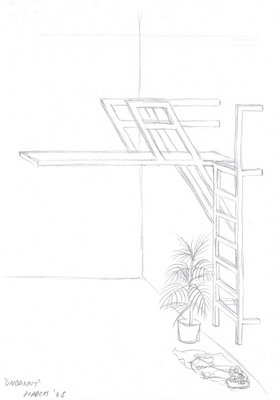In his essay, The Uncanny, Freud discusses the uncanny qualities of "the double". In a footnote he writes:
… it is interesting to observe what the effect is of meeting one's own image unbidden and unexpected. Ernst Mach has related two such observations in his Analyse der Empfindungen (1900). On the first occasion he was not a little startled when he realised that the face before him was his own. The second time he formed a very unfavourable opinion about the supposed stranger who entered the omnibus, and thought 'What a shabby-looking school-master that man is who is getting in!' – I can report a similar adventure. I was sitting alone in my wagon-lit compartment when a more than usually violent jolt of the train swung back the door of the adjoining washing cabinet, and an elderly gentleman in a dressing-gown and a travelling cap came in. I assumed that in leaving the washing-cabinet, which lay between the two compartments, he had taken the wrong direction and come into my compartment by mistake. Jumping up with the intention of putting him right, I at once realised to my dismay that the intruder was nothing but my own reflection in the looking-glass on the open door. I can still recollect that I thoroughly disliked his appearance. Instead,
therefore, of being frightened by our 'doubles', both Mach and I simply failed to recognise them as such. Is it not possible, though, that our dislike of them was a vestigial trace of the archaic reaction which feels the 'double' to be something uncanny.
p.248
In his essay, The Uncanny, Freud discusses the uncanny qualities of "the double". On the first occasion he was not a little startled when he realised that the face before him was his own. The second time he formed a very unfavourable opinion about the supposed stranger who entered the omnibus, and thought 'What a shabby-looking school-master that man is who is getting in!' – I can report a similar adventure. I was sitting alone in my wagon-lit compartment when a more than usually violent jolt of the train swung back the door of the adjoining washing cabinet, and an elderly gentleman in a dressing-gown and a travelling cap came in. I assumed that in leaving the washing-cabinet, which lay between the two compartments, he had taken the wrong direction and come into my compartment by mistake. Jumping up with the intention of putting him right, I at once realised to my dismay that the intruder was nothing but my own reflection in the looking-glass on the open door. I can still recollect that I thoroughly disliked his appearance. Instead,
therefore, of being frightened by our 'doubles', both Mach and I simply failed to recognise them as such. Is it not possible, though, that our dislike of them was a vestigial trace of the archaic reaction which feels the 'double' to be something uncanny.
p.248
